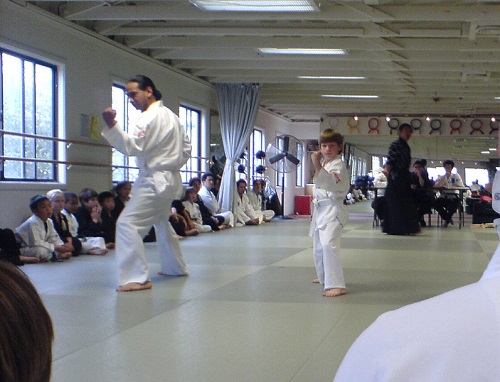It is impossible to begin to learn that which one thinks one already knows. – Epictetus

Kids are used to humble learning. But what about you? Can you maintain the openness of the White Belt Mind? Let go of what you think you know, and learn again.
What does that mean?
As is common with the limits on length on Twitter, the quote loses a little flavor from being shortened. The longer version is as follows:
“What is the first business of one who practices philosophy? To get rid of self-conceit. For it is impossible for anyone to begin to learn that which he thinks he already knows.”
Although the quote is specifically about philosophy, the first thing one must do when learning anything is to approach with an empty vessel. If your mind is already full of what you know, there is no room for anything else. And sometimes, what you think you know isn’t right.
By admitting that you might not know everything, you open the door for more information, or corrections, to enter your mind. But as soon as you know something, the door closes and your mind is no longer accessible.
Why is humility important?
Humility, specifically as it relates to knowledge or intellect, is what this quote is about. Socrates may have said it best when he said “As for me, all I know is that I know nothing.” He emptied his mind so that it could be filled. He humbled himself so that he might learn anything and everything.
Another way of saying this is that a closed mind gathers no new facts. If you already know the Sun moves around the Earth, why would you wonder about the odd movements of the planets? Would you even notice the similarity of how their moons move around them, and how it is like the way the planets move around the sky?
If someone already knows something, their curiosity is gone. Their desire to learn is weak or non-existent. They are not really paying attention to what is going on around them or looking for things which are out of place. They know it all, and nothing can surprise them. Until it does.
They are being arrogant about their knowledge, about what they know. They already know it all, so what is there left to learn? But if one can be humble, and admit that there are things left for us to learn, then that leads to a different attitude, and very different results. Chose wisely.
Where can I apply this in my life?
I suppose that depends on how much you really know. Seriously, what do you consider to be absolutely known to you, and about what are you unsure? The places to use this quote is in the places where you are absolutely certain that you already know everything about a subject.
The question then becomes “About what are you willing to reconsider, in case you might be wrong or in need of some new information?” Are you willing to have the ‘beginners mind’ or ‘the white belt mind.’ In martial arts the belt you are given when you first arrive is white, and helps you remember how little you know.
Even if you know another martial art, the system you are now learning may use similar, but slightly different moves, executed in a slightly different manner, because it is important for integrating into more advanced moves. Using your way in their system would be like trying to mix Legos and Tinker Toys. It won’t work well.
The point is that even if you do know one way to do something, there may be another equally valid way to do it. And there is always a chance that it may also be a little bit more efficient as well. It may not be as familiar or as comfortable as the way you are used to, but it is something you should consider.
This is probably most often applied when someone who knows a little bit (or more) about something attempts to learn more. They may not pay close attention, because they heard that before. But they might not have it right, or may have mis-heard it the first time. This quote is for these people.
But the real question is how does this quote apply to you? Are you a bit stubborn when it comes to learning new things? Do you avoid learning things as you already know it all, or at least enough to get by? Does it bother you that others know more, or are more proficient?
Take a moment and consider why or why not for each of the questions in the previous paragraph. Then consider what it might mean to have less ego, and more humility in this part of your life. What would be easier, and what might be more difficult? Might it help your relationships?
This quote is about setting aside your preconceived notions, and allowing yourself to be humble. Yes, it’s nice to be the fountain of knowledge, but if the water is stale, soon no one will drink from it, right?
From: Twitter, @philoquotes
confirmed at : https://en.wikiquote.org/wiki/Epictetus Discourses, Book II, ch. 17
Photo by Mikol






